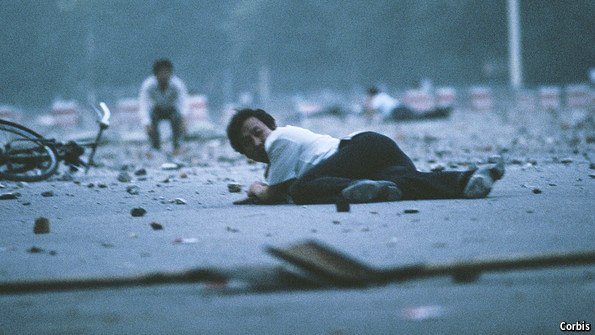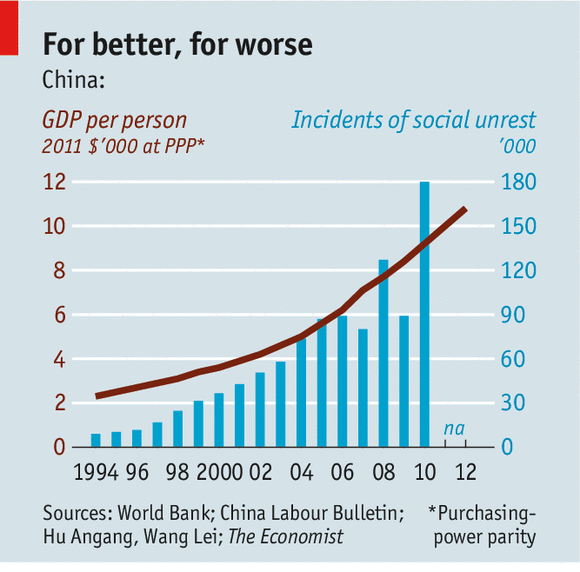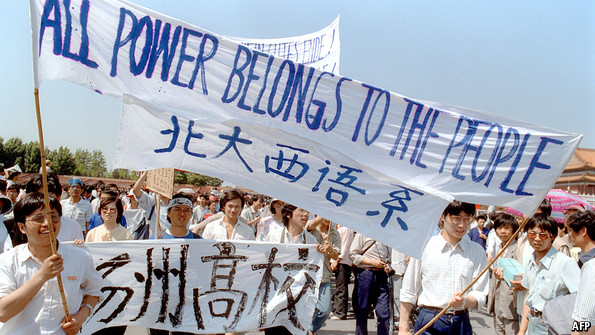本帖最後由 felicity2010 於 2014-5-31 11:58 AM 編輯 ( p3 b4 G' u1 F _2 o" l: @ Z C! `
" n! ] u- C7 d( S+ v+ d
Remembering Tiananmen
7 |( ]. Z4 t8 r5 s* k2 V) DThe lessons of history公仔箱論壇1 V; { r1 _( y& F# g: i
TVBNOW 含有熱門話題,最新最快電視,軟體,遊戲,電影,動漫及日常生活及興趣交流等資訊。* o7 J8 C& h* J4 m1 i5 W/ m
James MilesTVBNOW 含有熱門話題,最新最快電視,軟體,遊戲,電影,動漫及日常生活及興趣交流等資訊。 t9 a" H% u5 e, D Y
8 c5 f7 m0 J* X+ y& aTVBNOW 含有熱門話題,最新最快電視,軟體,遊戲,電影,動漫及日常生活及興趣交流等資訊。As our bureau chief leaves China, he reflects on the crushing of the protests he witnessed 25 years ago, and what has transpired since5.39.217.76. Q3 H9 L& g% g
5.39.217.764 p* c: ^' Y- a8 x
 TVBNOW 含有熱門話題,最新最快電視,軟體,遊戲,電影,動漫及日常生活及興趣交流等資訊。 \3 \' R& U. c6 a6 o TVBNOW 含有熱門話題,最新最快電視,軟體,遊戲,電影,動漫及日常生活及興趣交流等資訊。 \3 \' R& U. c6 a6 o
公仔箱論壇 a ^2 O- E2 ^ L8 F% I# K6 O* B* O
EVEN after the Chinese army moved into Tiananmen Square on the night of June 3rd 1989, and cleared it of the detritus left by the students who had occupied it for most of the previous seven weeks,it was several days before observers were certain who was in control of China.Your correspondent, looking down Beijing’s central boulevard, Chang’an Avenue,at a maze of still-burning barricades a day after the bloody operation, was not alone in wondering whether the Communist Party could ever heal. This newspaper,with which he was not then linked, summed up a common view: “This week China looked into the abyss of coup, counter-coup and civil war”. Foreign doomsayers were proved wrong. But even after 25 years of relative stability, it is still wise to be cautious about the cohesion of Chinese politics.
( L& i+ ^ ]6 O- M4 o0 s公仔箱論壇TVBNOW 含有熱門話題,最新最快電視,軟體,遊戲,電影,動漫及日常生活及興趣交流等資訊。3 W ~4 N! i' H+ p( K2 b. i
It was not just foreign observers who were given to apocalyptic musings at the time. “If the rebels had had their way,there would have been a civil war,” Deng Xiaoping told a visiting Chinese-American physicist, Tsung-Dao Lee, three months after the army crackdown that left hundreds, if not thousands, dead. Thanks to strenuous efforts by the Communist Party to erase memories of what happened (see article), many in China now have only a dim understanding of the history of the protests in Tiananmen Square and the nationwide unrest they triggered. But Deng’s analysis is remarkably close to the mainstream among the generation of young urban residents who have grown up since: if they have heard of the 1989 protests, many feel that, though the killings may have been bad,the army’s resolute action helped to create the stability that allowed China’s economy to grow from one that was then smaller than Britain’s into the world’s second-largest.0 [' k5 l+ \0 M" v9 b' {6 }
tvb now,tvbnow,bttvb6 ]* A. w/ A- q, D# l# h
This argument, however, glosses over the factional infighting within the party that paralysed decision-making and allowed the protests to grow to the scale they did. Even after Tiananmen, Deng appeared to recognise that political stability was by no means assured. By1992, then retired, he had concluded that the collapse of the Soviet Union and its allies was mainly attributable to their failure to make citizens richer. To avoid a similar fate for China, he went on his famous “southern tour” to drum up support for a fresh round of economic reform. It was this bold move, in the face of stiff conservative resistance, rather than the crushing of largely peaceful dissent, that laid the groundwork for China’s prosperity today. As he tottered round southern China, berating conservatives and calling for the liberation of China’s economy from ideological shackles, he remarked: “If any problem occurs in China, it will arise from within the party.” His words remain apt.公仔箱論壇8 u- ?+ V. g* {6 R& { H
' I6 v J4 m! ?1 ?tvb now,tvbnow,bttvbNot since the collapse of the Qing dynasty in1911 has China enjoyed such a prolonged period of stability as it has between Tiananmen and today (barring a handful of high-level purges and numerous street protests, most of them isolated and triggered by local grievances). Yet political risk is as important to bear in mind as the wobbles that are causing growing numbers of observers to worry about China’s economy. Neither kind of risk is grounds for immediate alarm. The government appears sufficiently in control of the economy’s levers (not least through ownership of the main commercial banks)and has sufficient assets at its disposal to prevent a sharp slowdown, at least for another few years. But one important lesson of Tiananmen is that politics in China has a capacity to surprise. Your correspondent recalls respected analysts in the months before June 1989 pooh-poohing rumours of a serious rift within the leadership.
d& |# V( I* K: k公仔箱論壇Xi’s got the powerTVBNOW 含有熱門話題,最新最快電視,軟體,遊戲,電影,動漫及日常生活及興趣交流等資訊。: N( a- ~ T z n4 j
" J' }6 m9 [! G* { j& p7 pTVBNOW 含有熱門話題,最新最快電視,軟體,遊戲,電影,動漫及日常生活及興趣交流等資訊。There are few such rumours today. Mr Xi is often described as the strongest leader in China since Deng, and he has been moving fast to consolidate his power (he has set up powerful new organs to oversee national security and economic reform, and has taken personal command of them). But there have been hints, both before and since the handover of power to Mr Xi in 2012, that politics at the top remains prone to strife. Eight months before Mr Xi took over, a fellow member of the ruling Politburo, Bo Xilai, was purged; ostensibly for corruption and abuse of power but also, many observers believe, because he threatened Mr Xi’s future grip on power. The mopping up continues. Mr Xi is now trying to eradicate the influence of Mr Bo’s powerful patron, Zhou Yongkang, who was the country’s security chief until here tired in 2012. Mr Zhou is being secretly investigated for corruption, the highest-ranking leader to be targeted on such grounds since the party took power in 1949. Rumours abound in Beijing that Mr Xi is encountering resistance from other retired elders who fear that he is rocking the boat.
% ], J" _) F% h6 E! n, C( E& y- oTVBNOW 含有熱門話題,最新最快電視,軟體,遊戲,電影,動漫及日常生活及興趣交流等資訊。
" `6 d7 a( r6 f9 M$ Z' o. I- hIt is extremely difficult to gauge the level of political stress that these developments are causing. Official statistics can be vague and misleading, but there is no concerted effort, as there is in politics, to keep the outside world in ignorance of pertinent facts. Contacts between Chinese leaders and foreign journalists were very limited before Tiananmen. They were curtailed even further after it. Not since November 1987has a general secretary of the party given the foreign press corps an unfettered opportunity to ask questions about his policies. Your correspondent vividly recalls the exhilaration of that occasion in the Great Hall of the People, when the newly appointed party chief, Zhao Ziyang, raised glasses with foreign journalists and fielded impromptu questions in an unprecedented display of openness. It would have been wrong to read too much into it, however. Zhaosaid that those who believed conservatives and reformers were at loggerheads would “make one mistake after another” in their analysis. He himself was purged by the conservatives during the Tiananmen upheaval and spent the rest of his life under house arrest.
2 f7 D9 w! \3 z: ytvb now,tvbnow,bttvb0 ^( g# ~4 B) {, [& q
Tussling with tigers
9 `+ b% f, J0 K. T5 e- E5.39.217.760 h7 T5 j4 W5 W0 x' ~
Mr Xi admits that economic reforms have entered “deep water”. As he put it on a trip to Europe last month: “We must get ready to go into the mountains, being fully aware that there may be tigers to encounter.” These tigers could include others at the top. Perhaps to avoid a Zhao-like fate (Zhao was the last party chief to put political reform high on his agenda), Mr Xi has begun his leadership with two parallel crackdowns, one on corruption and the other on political dissent. Part of his strategy, many believe, is to scare corrupt officials into compliance with his reforms while preventing dissidents from fanning the flames of discontent in a society that has undergone profound and wrenching change over the past decade alongside broad economic growth (see chart).tvb now,tvbnow,bttvb5 s+ w1 B3 | B7 l+ Q
& W1 d7 t4 a3 O( o' |0 ?' ]! P
 公仔箱論壇! p( E5 `5 H9 ?$ p$ A 公仔箱論壇! p( E5 `5 H9 ?$ p$ A
Mr Xi has three new social forces to contend with that grew to critical mass under his predecessor: a huge middle class, an equally large underclass of rural migrants, and online social media that have enabled discontents to connect and communicate with remarkable ease, in spite of vigorous censorship. He can probably prevent street demonstrations from coalescing into anything like the1989 unrest. Even if the economy were to slow sharply, a couple of years of stagnation might not pose a great threat to social stability.
7 ~: a/ W; M' G8 h/ Ptvb now,tvbnow,bttvb公仔箱論壇( N( e6 @: N- |1 y: O: t
After all, China has experienced slumps before. Tens of millions lost their jobs in the late 1990s as the regime closed down loss-making state-owned enterprises. Protests did erupt, but most were small. After the global financial crisis in 2008, millions of migrant workers were laid off from export industries. Most, however, had ties to plots in the countryside to which they returned for a few months before finding new work when manufacturing picked up. Despite the current slowdown, employment is holding up well. If the economy were to slow more dramatically, many migrant workers could again melt back into the villages.
& a! b/ b! U+ R% ]. \公仔箱論壇
5 H& @2 T# C6 q( T r5.39.217.76
3 Z9 X" L8 @2 a$ B/ X
* r: T; \4 q, W( k4 |$ w" `公仔箱論壇There are also reasons to worry about external dangers as China flexes its muscles to assert territorial claims in the East and South China Seas. Mr Xi appears to have abandoned Deng’s post-Tiananmen dictum that China should “hide its capacities and bide its time”. His latest territory-marking manoeuvre was the installation of an oil rig earlier this month in waters claimed by Vietnam. This triggered bloody anti-Chinese riots in Vietnam, but Mr Xi appears unconcerned by the risks. His moves seem calculated to avoid direct military conflict, but if a clash were to occur he might stand to gain politically at home. After Tiananmen the party launched a campaign to boost “patriotic education” among students. The aim was to portray the party as the embodiment of Chinese nationalism. It appears to have rubbed off. Young Chinese especially applaud Mr Xi’s more robust stance towards Japan, a country they are taught to abhor.TVBNOW 含有熱門話題,最新最快電視,軟體,遊戲,電影,動漫及日常生活及興趣交流等資訊。' z7 }4 p8 v! C9 V$ t1 ]% }3 A
5 `5 Y( v9 _% w# V7 U' U公仔箱論壇Elite politics, however, is more of a wildcard. The Bo affair in 2012, which only came to light thanks to the extraordinary flight of his police chief to an American consulate in the south-western city of Chengdu, was a sharp reminder of how erratic it can be. Both Mr Bo’s case and that of his mentor, Mr Zhou, have exposed the power and wealth of family networks within the leadership and their extensive influence in business. It will take all Mr Xi’s strength to keep high-level corruption in check. The protesters in 1989 were enraged by it even then; they would be astonished today. In a case that came to light in the Chinese press this month,an official was found to have 100m yuan ($16m) in banknotes stashed at his home.
- i' K: N$ c- y6 [2 U2 ~ S3 Rtvb now,tvbnow,bttvb5.39.217.76# M1 H( w3 b! q
Mr Xi’s sweeping campaign against corruption,the toughest in China in many years, will make him powerful enemies. So too will his efforts to expose big state-owned enterprises to greater competition and rein in profligate local governments. He has called for “decisive results”by 2020 in his drive for economic reform. Yet this will require measures that could make him unpopular with the public, such as the implementation of a property tax that will infuriate the better off. After Mr Bo’s arrest, rumours circulated on Chinese social media of an attempted coup by Mr Zhou. The reports proved fanciful, but they suggested that some Chinese at least are prepared to imagine extreme scenarios.公仔箱論壇0 @8 G" @ Y: j% ~' N$ v( w
9 e, O* u0 g. W/ d$ UTVBNOW 含有熱門話題,最新最快電視,軟體,遊戲,電影,動漫及日常生活及興趣交流等資訊。Your correspondent leaves China believing that the party has a good chance of maintaining its grip on power during Mr Xi’s remaining eight years at the top. But the risks—political, economic and international—are growing. The party has proved unexpectedly adept at tackling a series of crises since 1989. But it will need to be even more agile if it is to remain in power for another 25 years.0 W1 W6 q) Z' X1 @! p4 r
# q. `. Y( x1 P7 ~6 Rtvb now,tvbnow,bttvb公仔箱論壇; {$ U: v+ s/ P/ G, B( M) K
|


